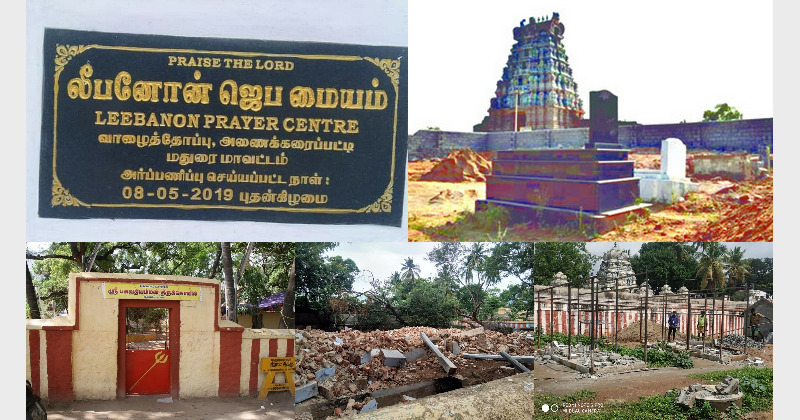Temple lands across India are under serious threat. These lands, which hold spiritual, historical, and social value, are increasingly falling victim to encroachments, political exploitation, and administrative neglect. Unlike defence or forest lands—both protected by robust central legislation—temple lands are governed by inconsistent state-level laws, making them easy targets for land grabbers and vote-bank politics.
Since India gained independence, the management of Hindu temples in various states has predominantly been under the control of state governments. This oversight was initially meant to promote administrative efficiency, ensure financial transparency, and maintain the temples properly. However, what began as oversight gradually evolved into interference—and ultimately, neglect.
Despite being under state supervision, extensive areas of temple-owned land have been systematically encroached upon over the years. These lands—often donated by devotees over centuries for religious, cultural, and charitable purposes—have been unlawfully seized by private individuals, political operatives, and organized land mafias.

Regularisation of Encroachments for Vote Banks
The irony is striking: despite government oversight, the very institutions responsible for protecting temple assets have stood idly by as these assets were exploited. Even more troubling, state governments have often appeared not only powerless but also complicit. In numerous cases, rather than enforcing the law and reclaiming the encroached lands, authorities have chosen to legitimize these illegal occupations. This was not due to legal obligations or moral considerations—it was a matter of political convenience. In their quest to appease certain voter demographics, successive governments have ignored illegality and prioritized immediate electoral benefits over long-term institutional integrity.

Encroachment Menace Is Worse in Southern States
The issue is systemic and extends beyond any single state. Tamil Nadu, Andhra Pradesh, Karnataka, Telangana, and Maharashtra have all experienced significant encroachments on temple land. Reports from temple boards, audits, and even judicial decisions have validated the extent of the problem, yet meaningful action remains infrequent.
What exacerbates the situation is that religious institutions, unlike private properties, are intended to benefit the public and safeguard cultural heritage. The income generated from temple lands supports daily rituals, festivals, temple upkeep, remuneration of priests and staff, and assistance for local communities. When these lands are compromised, temples are forced to depend on dwindling state support or to raise fees for devotees—both unsustainable solutions.
Hindus Taken for Granted by Governments
Ultimately, the narrative surrounding temple land encroachments transcends mere property disputes. It reflects a deeper decline in accountability, the politicization of religion, and the failure of governance. If temples are to be preserved—not just as places of worship but also as historical, cultural, and economic institutions—their lands must be safeguarded with the seriousness they warrant.
Despite their sacred origins and public function, temple lands have become vulnerable targets for encroachment. Thousands of acres have been unlawfully occupied, sold, or leased—often with the tacit approval or active involvement of local authorities.

Why Central Laws Are Needed
- To Ensure Equal Protection Under Law
Defence lands are protected under strict military regulations. Forest lands are safeguarded by the Forest (Conservation) Act, 1980. These categories are non-negotiable—protected for national interest. Temple lands, equally vital to our civilizational heritage, deserve the same level of protection.
- To Prevent Political Misuse by State Governments
Across states, temple lands are being encroached and then legalized through politically motivated schemes. This undermines the very purpose of land donations made by devotees and kings over centuries. Without central oversight, these lands will continue to be exploited for short-term electoral gains. Temple lands were donated for public welfare—feeding the poor, supporting religious services, and funding schools and hospitals. Their loss is a loss to the public. Their protection is not just a religious issue—it’s a public trust issue.
- To Maintain the Integrity of Land Records and Prevent Corruption
Temple land records are often outdated or deliberately manipulated. A central law can mandate digitization, national audits, and legal enforcement, reducing corruption and preventing land fraud.
What Must Be Done
- Pass the Central Temple Lands Protection Act
This law should:- Ban unauthorized transfer, lease, or regularization of encroachments
- Criminalize encroachments with clear penalties and speedy trials
- Bring temple lands under a central registry, just like defence and forest lands
- Prohibit political interference in land management
- Create a National Temple Lands Authority
An independent body with auditing powers, enforcement teeth, and accountability mechanisms. - Digitize and Demarcate All Temple Lands
Launch a nationwide GIS-based mapping and digitization drive to secure temple lands from fraud and encroachment.

Temple lands are a legacy of devotion and service. Letting them be looted for votes is an injustice to history, faith, and public welfare. It’s time to act—not with patchwork reforms, but with a firm, central law that protects temple lands just like we protect forests and defence installations.
This is not about religion—it’s about responsibility. India must protect its spiritual and cultural foundations with the same seriousness it protects its strategic and ecological ones.






